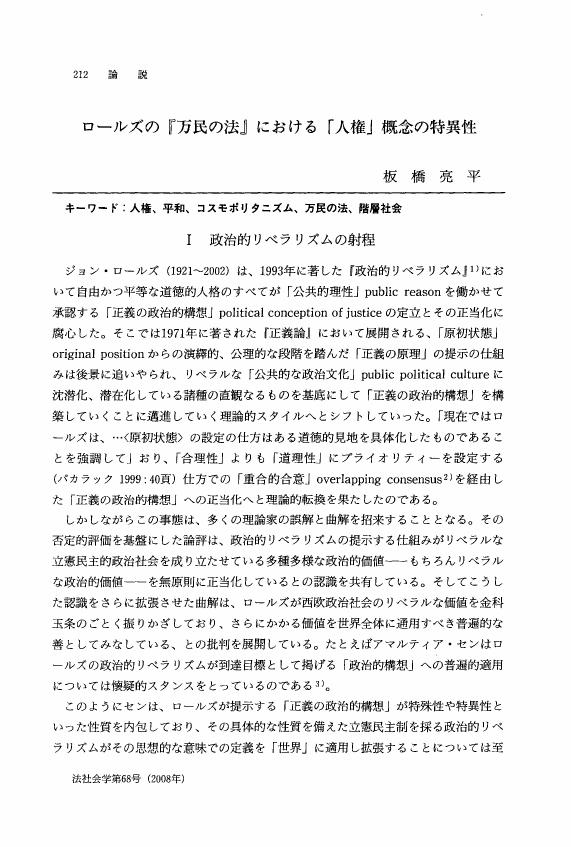4 0 0 0 OA 反照的均衡にかんする一試論 : 日本におけるジョン・ロールズ研究の分析と限界
- 著者
- 板橋 亮平
- 出版者
- 日本法政学会
- 雑誌
- 法政論叢 (ISSN:03865266)
- 巻号頁・発行日
- vol.47, no.1, pp.73-87, 2010-11-15
Rawls is currently a very popular research topic. Although this is a desirable situation, studies on Rawls are full of inaccurate discourses. In Japan, too, studies especially on reflective equilibrium-are full of errors. In this paper I will demonstrate this, especially in the case of Japanese research.
1 0 0 0 OA ロールズの『万民の法』におけるカントの位置付け : カントの『永遠平和のために』を中心に
- 著者
- 板橋 亮平
- 出版者
- 日本法政学会
- 雑誌
- 法政論叢 (ISSN:03865266)
- 巻号頁・発行日
- vol.45, no.1, pp.103-124, 2008-11-15 (Released:2017-11-01)
The purpose of this paper is to clarify the different views in Rawls's The Law of Peoples from Kant's Perpetual Peace. The reason why I write this paper is that Rawls says The Law of Peoples depends on Kant's Perpetual Peace and he himself doesn't indicate the different points. First, by comparing the international law with the law of peoples, I demonstrate that there are different points as to the theoretical construction between them. Secondly, I indicate that there is a different stance as to self-defense of war between them. Thirdly, I maintain that the political that Rawls thinks of is different from the political that Kant states. Fourthly, I emphasize that the relation the international law supposes is different from the relation the law of peoples supposes.
1 0 0 0 OA ロールズの『万民の法』における「人権」概念の特異性
- 著者
- 板橋 亮平
- 出版者
- 日本法社会学会
- 雑誌
- 法社会学 (ISSN:04376161)
- 巻号頁・発行日
- vol.2008, no.68, pp.212-230, 2008 (Released:2017-01-31)
1 0 0 0 OA ロールズの『万民の法』におけるカントの位置付け : カントの『永遠平和のために』を中心に
- 著者
- 板橋 亮平
- 出版者
- 日本法政学会
- 雑誌
- 法政論叢 (ISSN:03865266)
- 巻号頁・発行日
- vol.45, no.1, pp.103-124, 2008-11-15
The purpose of this paper is to clarify the different views in Rawls's The Law of Peoples from Kant's Perpetual Peace. The reason why I write this paper is that Rawls says The Law of Peoples depends on Kant's Perpetual Peace and he himself doesn't indicate the different points. First, by comparing the international law with the law of peoples, I demonstrate that there are different points as to the theoretical construction between them. Secondly, I indicate that there is a different stance as to self-defense of war between them. Thirdly, I maintain that the political that Rawls thinks of is different from the political that Kant states. Fourthly, I emphasize that the relation the international law supposes is different from the relation the law of peoples supposes.
1 0 0 0 OA 政治的共生はいかにして可能か : ジョン・ロールズの政治的正義論
- 著者
- 板橋 亮平
- 出版者
- 日本法政学会
- 雑誌
- 法政論叢 (ISSN:03865266)
- 巻号頁・発行日
- vol.42, no.2, pp.164-177, 2006-05-15
The purpose of this paper is to demonstrate how possible political consensus is given a fact of pluralism of comprehensive doctrines, good and values. Firstly I indicate that Rawlsian political conception of justice is not constructed from the historical or religious background or the inherent logic but that the conception is transcendental. Secondly I maintain that the political conception of justice is derived not from the comprehensive doctrines or moral values but from a moral Kantian conception of free and equal citizens or persons. Thirdly I make it clear that the political conception of justice based on tha moral Kantian conception does not destroy pluralism of comprehensive values but makes the reasonable overlapping consensus possible, while unreasonable values or doctrines independently of the overlapping consensus enjoy the liberties.
1 0 0 0 OA 後期ロールズにおけるふたつのリベラリズムについて : 前期ロールズとの連続性を視野に
- 著者
- 板橋 亮平
- 出版者
- 日本法政学会
- 雑誌
- 法政論叢 (ISSN:03865266)
- 巻号頁・発行日
- vol.44, no.1, pp.154-183, 2007-11-15
The purpose of this paper is to distinguish "limited liberalism" which has the political notion that the political conception or principle of justice is established independently of comprehensive doctrines or one's own good as self-determined value from "comprehensive liberalism" which has the political thought that the political conception or principle of justice is formed based on the logic or the substance of the comprehensive doctrines or the cultural identity. By doing this I maintain that the latter rawlsian liberalism contains both limited liberalism and comprehensive liberalism which are incompatible with each other. And as a whole I indicate that a mixture of two kinds of liberalism is also inherent in the former rawlsian liberalism. This demonstration makes the general view that Rawls is a covert who abandons the former rawlsian liberalism and adopts the latter rawlsian liberalism cause a misunderstanding. Firstly I emphasize an ingenious idea of Rawls's own which distinguishes the essential definition of justice from the substance of justice differently from the others who construct the theory of classical social contract. Secondly, however, on the other hand, I indicate that the essential definition of justice is diluted and that the logic of the substance of justice is emphasized by using the theoretical device of reflective equilibrium. Thirdly I dinstiguish the reasonable pluralism from the pluralism. I demonstrate that the reasonable pluralism as a normative conception can be realized after the latter that the comprehensive doctrines is incompatible with one another is relieved. And I maintain that this resolution also contains both limited liberalism and comprehensive liberalism and that in this point the former rawlsian liberalism is identical with the latter rawlsian liberalism.




